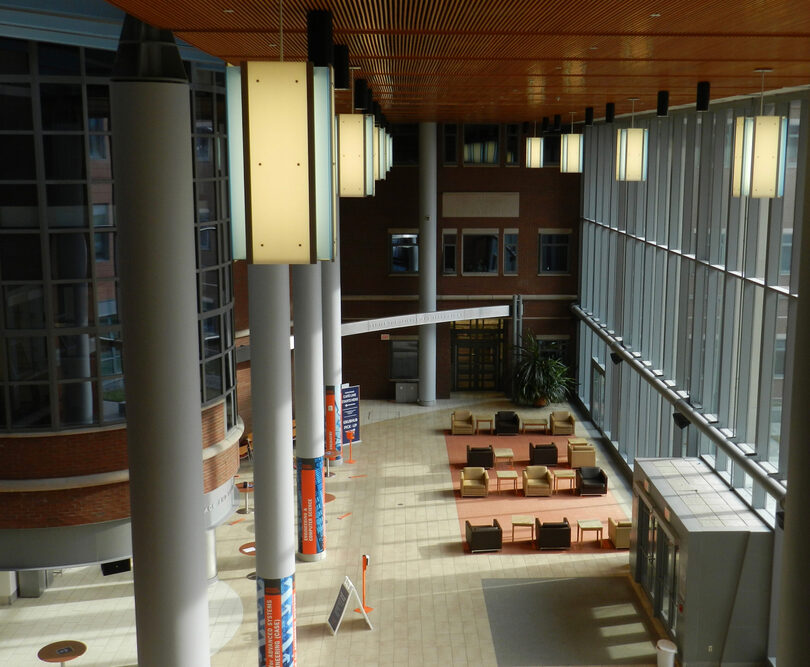Pre-health advising at SU needs further aid to better support students

Daily Orange File Photo
Pre-med advisors at SU must prioritize building positive relationships with and empowering their students, not weeding them out, our columnist writes.
I came to Syracuse University in hopes of one day becoming a doctor, but my dream was short lived. I expected to face the typical pre-med obstacles — a heavy workload and loss of sleep — but I did not expect to be left on my own, unsupported by the advisors who were meant to guide me.
A week into my first year at SU studying neuroscience and biology in 2022, I attended an orientation for pre-health students to learn what the next four years of their lives would look like. As the presentation went on, the faces of those around me started to drop as we were informed about how unattainable our shared dream is.
I was told that it was unlikely for me to get into medical school while also studying abroad or without taking a gap year, and that the statistics were not in my favor. Recognizing the challenges that come with gaining admission into medical school is fair, but aspiring students need support and positive reinforcement along that journey. The discouragement from advising members always made me feel that I was simply average and would need to prove myself, rather than that I was capable and had my own potential.
Later into the year I needed to register for classes, but between the constant changes in my advisors and the unwelcoming atmosphere in the pre-health office, I often felt discouraged from seeking the help and guidance that I needed.
Lauren Goebel, a pre-health sophomore studying biology, also feels that advisors should better empower students more.
“It has been isolating and disheartening because when I ask for guidance, they have been dismissive, making my goal of getting into medical school seem far-fetched,” Goebel said. “They should encourage students to discover if science and healthcare is something they are interested in instead of making an already challenging field seem more daunting. People should not be scared of becoming a doctor.”
By the end of my first semester, I looked to switch my primary major from biology to chemistry, but when I emailed my current and past advisors, I received no response. My chemistry professor was kind enough to add me to the department email chains and notify me of important events and classes to take. Ultimately, they helped me change my major, not my advisor.
In an email to the Daily Orange, an SU spokesperson said, “The College prides itself on a tailored advising approach for all our students, including as it relates to our pre-health advising program. One of the critical goals of the program is supporting students on their path to medical school and advising them on how and when to submit an application that gives them the highest likelihood of being accepted.”
Unfortunately, not everyone is reaping the benefits that the department has intended.
It was not until the end of my second semester freshman year that I started my transition out of my pre-health track, a decision I made after a year of feeling like my goal was no longer worth it. I was wary to ask for help and worried that I was alone in my experience. The culmination of those negative experiences left me feeling like I was not good enough to ever be accepted into medical school.
Summer Green, a junior studying political science and psychology, left her pre-health track after a year and a half due to a similar experience.
“The lack of support from the advisors further pushes the stigma that pre-med is made to weed out people,” Green says.
Currently, there is projected to be a shortage of up to 124,000 physicians in the U.S., a trend likely to continue up to 2034. Weeding out students already leaves them feeling intimidated and substandard; it is vital that advisors are there to encourage students to reach their goals and provide them with a positive space.
In my experience, I didn’t feel supported by my advisors, and wasn’t given the opportunity to build personal connections with them. Other current and former pre-health students I have been able to speak with agreed with me.
In a field that is already notoriously difficult, further discouragement is the reason why many, including myself, give up. It is important for students to grow a personal and uplifting relationship with their advisor in order for them to feel confident in their abilities.
At SU, many students experience inconsistencies with their advisors. But those on the pre-health track need better, more personable help in particular given the intensity of their curriculums.
According to the SU spokesperson, “the College prides itself on a tailored advising approach for all our students.” That sentiment should be clear for every pre-health student.
If I had a more positive environment, maybe I would have become a doctor.
Emma Maseng is a sophomore International Relations major. Her column appears bi-weekly. She can be reached at Emaseng@syr.edu.




